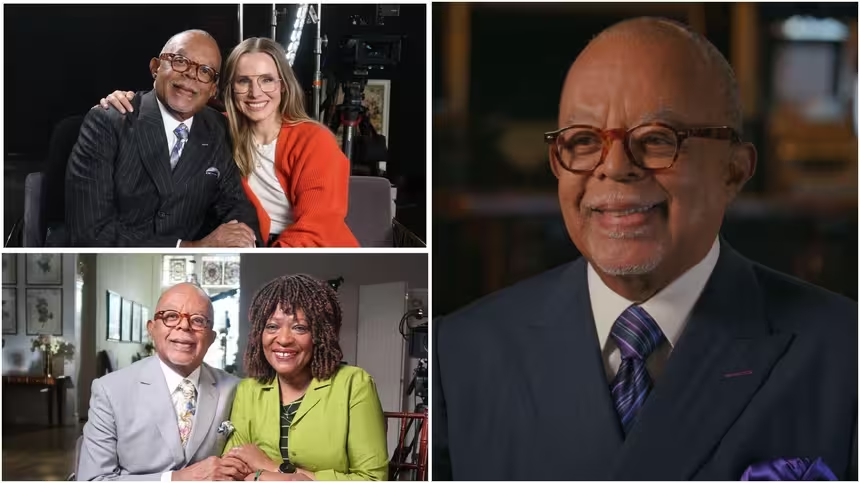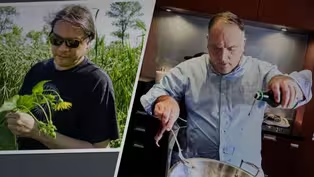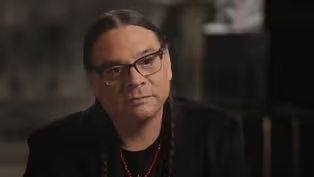Finding Your Roots
José Andrés Discovers His Ancestors Were Bakers
Clip: Season 11 Episode 5 | 4m 41sVideo has Closed Captions
José discovers his paternal great-great grandmother was abandoned and given to nuns as a baby.
José Andrés discovers his paternal great-great grandmother was abandoned and given to nuns as a baby.
Problems playing video? | Closed Captioning Feedback
Problems playing video? | Closed Captioning Feedback
Corporate support for Season 11 of FINDING YOUR ROOTS WITH HENRY LOUIS GATES, JR. is provided by Gilead Sciences, Inc., Ancestry® and Johnson & Johnson. Major support is provided by...
Finding Your Roots
José Andrés Discovers His Ancestors Were Bakers
Clip: Season 11 Episode 5 | 4m 41sVideo has Closed Captions
José Andrés discovers his paternal great-great grandmother was abandoned and given to nuns as a baby.
Problems playing video? | Closed Captioning Feedback
How to Watch Finding Your Roots
Finding Your Roots is available to stream on pbs.org and the free PBS App, available on iPhone, Apple TV, Android TV, Android smartphones, Amazon Fire TV, Amazon Fire Tablet, Roku, Samsung Smart TV, and Vizio.
Buy Now

Explore More Finding Your Roots
A new season of Finding Your Roots is premiering January 7th! Stream now past episodes and tune in to PBS on Tuesdays at 8/7 for all-new episodes as renowned scholar Dr. Henry Louis Gates, Jr. guides influential guests into their roots, uncovering deep secrets, hidden identities and lost ancestors.Providing Support for PBS.org
Learn Moreabout PBS online sponsorshipWe weren't able to identify Oracia's biological parents.
However, we did manage to learn a surprising amount of detail about her life.
Starting in the archives of what's known as the Almeria Foundling Home.
Here, we uncovered a record that describes exactly how Oracia was abandoned.
"She was put through the main torno at 8:15 PM on the 27th of June 1845, wrapped in two old bags."
Wow.
Wrapped two old bags.
Have you ever heard of a torno?
Yeah, the torno in many of the convents where...las monjas de clausura, the nuns.
Mm-hmm.
Don't have any connection with outside world.
Mm-hmm.
The torno would be the, the way to, even to this day, you can go to some monasteries in Spain, and still some of these monasteries, those convents.
Where the nuns will pay the bills, making cookies, and selling traditional cookies, or honey, all the things.
And the way you will come and get those cookies will be through that torno, and the way you will pay.
And that's, that's the way still to this day.
And it's also where if you wanted to abandon your child, put up your child, give it to the nuns, you put it on the torno.
Wow.
That's, that's fascinating.
Most abandoned children faced dismal prospects.
Indeed, many did not live beyond infancy, but Oracia beat the odds.
Sometime before her fourth birthday, she was taken in by a couple named María and Sebastián Vicente.
They not only raised her, but they also put aside money, so that she would have a kind of trust fund when she became an adult.
An extraordinary arrangement that raised the fascinating question... Could the couple have been acting on behalf of Oracia's biological family?
Oh, my God.
Yes!
Why would they adopt this child and give her all this money?
We think that it's possible that they knew the birth parents, and they were making things right.
We don't know, but it seems plausible.
That even they could be the parents themselves?
Yeah, they could be.
They could be.
But we'll never know.
Three years later, but we'll never know.
Wow.
According to the scholar we consulted, the documents would make sure not to reveal the details.
So the truth is lost to history.
That's good news.
Even this happened long time ago.
Obviously this only shows you the life of some.
Mm-hmm.
Winston Churchill said that success was going from failure to failure without losing enthusiasm.
Even in the hard times you keep going.
But I'm happy that, obviously I'm thrilled, you know, obviously I made it here, so something had to go right at one moment.
That's right.
Or you wouldn't be here baby.
Oh, my God.
Regardless of whether or not they were or Oracia's relatives, María and Sebastián clearly felt a deep love for her.
And Oracia seems to have flourished thanks to their efforts.
In July of 1864, she even started a family of her own, marrying José's great-great-grandfather, a man named Miguel de la Casa Rova.
Wow.
What's it like to think of all Oracia had been through to get to that day?
Fascinating.
And she married young, 19!
And married a younger man!
17!
Unbelievable.
Yeah.
And guess what?
After your great-great-grandparents married, they received that money.
They received a Oracia's trust.
They started their family, and they began working as bakers.
No!
They were bakers, baby.
That's amazing!
You came by it naturally!
I was telling my wife the other day, one of the things we gonna do when I grow older, is we're gonna move to a town, could be in Haiti, could be in Spain, can be in the Dominican Republic, but the town we feel like our contribution can help the town.
And one of the things, I'll do a bakery that will do the traditional bread in the place we are, whatever.
So it's kind of fascinating.
It is.
You descend from bakers.
The bread that keeps on giving.
Video has Closed Captions
Preview: S11 Ep5 | 30s | Henry Louis Gates, Jr. explores the ancestry of notable chefs José Andrés & Sean Sherman. (30s)
Sean Sherman Learns About A Tragic Past
Video has Closed Captions
Clip: S11 Ep5 | 4m 7s | Sean learns of his ancestor who was sent to the Carlisle Indian Industrial School. (4m 7s)
Providing Support for PBS.org
Learn Moreabout PBS online sponsorship

- History
Great Migrations: A People on The Move
Great Migrations explores how a series of Black migrations have shaped America.












Support for PBS provided by:









